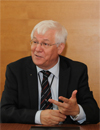 |
||
|
World Energy Investment Needs to Grow to $48 Trillion by 2035 - IEA RIA Novosti, PUBLISHED 03.06.2014 The world's energy requires a $48-trillion investment to satisfy its needs for the next two decades, according to a report published by International Energy Agency (IEA) Tuesday. “The reliability and sustainability of our future energy system depends on investment,” IEA Executive Director Maria van der Hoeven said in the organization's statement. The IEA has launched research into alternative energy sources after the 1973-74 oil crises, when several Arabic countries, members of the Organization of Arab Petroleum Exporting Countries or the OAPEC, embargoed oil export for 5 months, pushing the oil price from $3 to $12. Topics: Opinions Other news: Russia May Sign Agreement to Build 8 Reactors in Iran A source close to the negotiations told journalists Thursday. Hungary Enacts Law to Expand Nuclear Power With Russian Aid Hungary’s president has signed a bill into law to expand a nuclear power plant in the country with Russian assistance. Hungary Lawmakers OK Russia Nuclear Plant Deal Russia will provide Hungary a loan of up to 10 billion euros ($13.5 billion) - around 80 percent of construction costs. |
Hero of the day 
We are currently working with the Nuclear Decommissioning Authority (NDA) on this approach, which was submitted in response to their February 2012 call for alternative proposals. We appreciate that the UK is in the early stages of their policy development activities and are pleased to be involved in such important work. INTERVIEW
Yanko Yanev OPINION
Joint Plan of Action |

